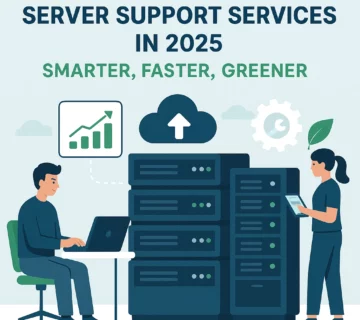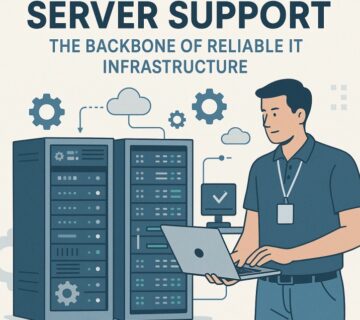Why Server Support Is Crucial for Uptime and Security

Businesses rely heavily on their IT infrastructure to maintain operations, serve customers, and protect sensitive data. The backbone of this infrastructure lies in robust server systems that require consistent monitoring, maintenance, and expert care. Understanding why professional server support is essential can mean the difference between seamless operations and costly downtime that damages your reputation and bottom line.
The Critical Role of Server Support in Modern Business
Server support encompasses a comprehensive range of services designed to keep your systems running optimally. Whether you’re managing an in-house data center or leveraging cloud infrastructure, having reliable support ensures your technology investments deliver maximum value while minimizing risks.
Essential Functions of Professional Server Support
Professional server maintenance goes beyond basic troubleshooting. It involves strategic planning, preventive measures, and rapid response capabilities that keep your business operational 24/7. Without proper support, even minor issues can escalate into major disruptions that affect productivity, customer satisfaction, and revenue generation.
Impact on Business Operations
The reliability of your server infrastructure directly affects every aspect of your business operations. From customer-facing applications to internal productivity tools, servers form the foundation that enables digital business processes to function smoothly and efficiently.
Understanding Common Server Challenges
Every business faces various common server problems that can impact operations. These issues range from hardware failures and software conflicts to security vulnerabilities and performance degradation. Resource exhaustion, network connectivity problems, and outdated software versions frequently cause unexpected downtime.
Hardware-Related Issues
Storage limitations often create bottlenecks that slow down applications and frustrate users. Database corruption, memory leaks, and configuration errors can bring entire systems to a halt. Temperature fluctuations, power supply issues, and component wear also contribute to system instability.
Software and Configuration Problems
The complexity of modern server environments means that identifying and resolving these problems requires specialized knowledge and experience. A single server problem can have cascading effects throughout your entire infrastructure, making quick resolution crucial for maintaining business continuity.
The Evolution of Server Support Services
Traditional server management required dedicated on-site personnel and significant infrastructure investments. Today, outsourced server support has emerged as a cost-effective alternative that provides access to expert knowledge without the overhead of maintaining an internal team.
Modern Monitoring Solutions
Outsourced server monitoring services utilize advanced tools and technologies to track system performance, identify potential issues, and respond proactively to emerging threats. These services operate around the clock, ensuring your systems receive attention even during off-hours when problems typically occur.
Market Growth and Innovation
The virtual private server market has expanded dramatically as businesses seek flexible, scalable solutions that reduce capital expenditure while improving reliability. This growth has driven innovation in support methodologies and service delivery models.
Benefits of Professional Server Management
Outsourced server management offers numerous advantages over internal solutions. Expert technicians bring years of experience and specialized training that would be costly to develop in-house. They stay current with emerging technologies, security threats, and best practices that keep your systems secure and efficient.
Financial Advantages
Cost predictability is another significant benefit. Instead of unexpected expenses for emergency repairs or system replacements, server support services typically offer fixed monthly rates that make budgeting easier and more accurate. This approach eliminates the need for costly emergency response fees during critical situations.
Advanced Technology Access
Access to advanced monitoring tools and diagnostic equipment means problems are often identified and resolved before they impact users. This proactive approach reduces downtime and maintains the high availability that modern businesses require.
Proactive Management: Prevention Over Reaction
Proactive server management represents a fundamental shift from reactive troubleshooting to preventive maintenance. This approach involves continuous monitoring, regular updates, and strategic planning that prevents problems before they occur.
Automated Monitoring Systems
Automated monitoring systems track key performance indicators, resource utilization, and security metrics in real-time. When thresholds are exceeded or anomalies are detected, support teams receive immediate alerts that enable rapid response. This early warning system prevents minor issues from becoming major outages.
Preventive Maintenance Schedules
Regular maintenance schedules ensure that software updates, security patches, and hardware inspections occur consistently. This systematic approach reduces the likelihood of unexpected failures and extends the lifespan of your equipment.
Cloud Migration and Modern Solutions
The transition from server to cloud represents one of the most significant changes in IT infrastructure management. Cloud server migration requires careful planning, expert execution, and ongoing support to ensure success.
Migration Process and Planning
Migration projects involve assessing current infrastructure, planning the transition, executing the move, and optimizing the new environment. Each step requires specialized knowledge and experience to avoid data loss, minimize downtime, and ensure compatibility with existing systems.
Post-Migration Support Requirements
Post-migration support is equally important. Cloud environments require different management approaches, monitoring strategies, and optimization techniques. Solutions to server problems in cloud environments often involve different tools and methodologies than traditional on-premises systems.
Effective Server Troubleshooting Strategies
Server troubleshooting requires systematic approaches that quickly identify root causes and implement effective solutions. Experienced technicians follow established protocols that minimize diagnostic time while ensuring comprehensive problem resolution.
Documentation and Analysis
Documentation plays a crucial role in effective troubleshooting. Detailed logs, configuration records, and change histories provide valuable insights that speed up problem identification. Regular backups and recovery procedures ensure that data remains protected even during major system failures.
Remote Diagnostic Capabilities
Remote diagnostic capabilities enable support teams to investigate issues without requiring on-site visits. This approach reduces response times and allows for faster resolution of common problems. However, complex issues may still require physical access to equipment and components.
Choosing the Right Server Support Company
Selecting an appropriate server support company requires careful evaluation of capabilities, experience, and service offerings. Look for providers with proven track records in your industry and technology stack. Certifications, client testimonials, and case studies provide insights into their expertise and reliability.
Service Level Agreements
Response time guarantees are crucial for critical systems. Understand what constitutes an emergency, how quickly support teams respond, and what escalation procedures exist for complex issues. Clear service level agreements protect your interests and ensure accountability.
Communication and Reporting
Communication capabilities matter significantly during crisis situations. Your support provider should offer multiple contact methods and maintain clear communication throughout problem resolution processes. Regular reporting and performance metrics help track service quality over time.
Security Considerations in Server Support
Security represents one of the most critical aspects of server management. Support teams must understand current threat landscapes, implement appropriate protective measures, and respond quickly to security incidents. Regular security audits and vulnerability assessments help identify potential weaknesses before they’re exploited.
Access Control and Authentication
Access controls and authentication mechanisms ensure that only authorized personnel can modify system configurations or access sensitive data. Support providers should maintain strict security protocols and provide detailed audit trails for all administrative activities.
Compliance and Regulatory Requirements
Compliance requirements add another layer of complexity to server management. Healthcare, financial services, and government organizations must adhere to specific regulations that govern data handling, system access, and incident reporting. Your support provider should understand these requirements and ensure compliance.
Cost-Effectiveness of Outsourced Solutions
The financial benefits of outsourced support extend beyond simple cost reduction. Access to enterprise-grade tools, expert knowledge, and 24/7 monitoring capabilities would require significant investments if developed internally. Outsourcing provides these capabilities at a fraction of the cost.
Risk Mitigation Benefits
Risk mitigation represents another financial advantage. Professional support reduces the likelihood of extended outages, data loss, and security breaches that can result in significant financial losses. Insurance premiums may also be reduced when professional support services are in place.
Scalability and Growth
Scalability benefits allow support costs to grow proportionally with your business. As your infrastructure expands, support services can be adjusted accordingly without requiring additional hiring or training investments.
Future Trends in Server Support
Artificial intelligence and machine learning are transforming server support capabilities. Predictive analytics can identify potential failures before they occur, while automated remediation can resolve common issues without human intervention. These technologies are making support more efficient and effective.
Emerging Technologies
Edge computing is changing how server infrastructure is deployed and managed. Distributed systems require new approaches to monitoring, maintenance, and support. Support providers are developing new capabilities to address these emerging requirements.
Hybrid Cloud Environments
Hybrid cloud environments are becoming increasingly common as businesses seek to balance control, cost, and flexibility. Supporting these complex environments requires expertise in multiple platforms and integration technologies.
Measuring Server Support Effectiveness
Key performance indicators help evaluate the effectiveness of your server support arrangements. Uptime percentages, mean time to resolution, and response times provide quantitative measures of service quality. Customer satisfaction surveys and feedback mechanisms offer qualitative insights.
Performance Monitoring and Review
Regular review meetings with your support provider help identify areas for improvement and ensure that service levels meet your evolving needs. Performance trends over time indicate whether your support arrangement is becoming more or less effective.
Cost Analysis and Optimization
Cost per incident metrics help evaluate the financial efficiency of your support arrangement. This information can guide decisions about service level adjustments or provider changes.
Frequently Asked Questions
What is professional server support?
Professional server support encompasses comprehensive technical services designed to maintain, monitor, and optimize server infrastructure. This includes 24/7 monitoring, proactive maintenance, security management, troubleshooting, and strategic planning to ensure maximum uptime and performance.
How does outsourced server monitoring work?
Outsourced server monitoring utilizes advanced tools and technologies to continuously track server performance, resource utilization, and security metrics. Remote monitoring centers staffed by expert technicians receive real-time alerts when issues are detected, enabling rapid response and problem resolution.
What are the most common server problems businesses face?
Common server problems include hardware failures, software conflicts, security vulnerabilities, resource exhaustion, network connectivity issues, storage limitations, database corruption, and configuration errors. These problems can cause downtime, performance degradation, and security risks if not addressed promptly.
Why should businesses consider outsourced server management?
Outsourced server management provides access to expert knowledge, advanced monitoring tools, and 24/7 support without the overhead of maintaining an internal team. This approach offers cost predictability, improved reliability, and access to specialized skills that would be expensive to develop in-house.
What is proactive server management?
Proactive server management focuses on preventing problems before they occur through continuous monitoring, regular maintenance, automated alerts, and strategic planning. This approach reduces downtime, extends equipment lifespan, and maintains high availability compared to reactive troubleshooting methods.
How do I choose the right server support company?
When selecting a server support company, evaluate their experience in your industry, technical certifications, response time guarantees, communication capabilities, and service level agreements. Look for providers with proven track records, positive client testimonials, and expertise in your specific technology stack.
What should I expect from server troubleshooting services?
Server troubleshooting services should provide systematic problem identification, root cause analysis, and effective solutions with minimal downtime. Expect detailed documentation, clear communication throughout the process, and preventive recommendations to avoid similar issues in the future.
How does cloud server migration affect support requirements?
Cloud server migration changes support requirements by introducing new technologies, management approaches, and optimization strategies. Support teams need expertise in cloud platforms, migration tools, and hybrid environments to ensure successful transitions and ongoing management.
What are the key benefits of the virtual private server market?
The virtual private server market offers flexibility, scalability, and cost-effectiveness compared to dedicated hardware. VPS solutions provide dedicated resources, improved security, and easier management while reducing capital expenditure and infrastructure complexity.
How can server support services improve business continuity?
Server support services improve business continuity through proactive monitoring, rapid problem resolution, disaster recovery planning, and preventive maintenance. These services minimize downtime risks, ensure data protection, and maintain the reliability that modern businesses require for operations.




No comment